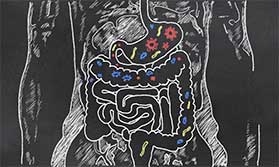Small Intestine Bacterial Overgrowth (SIBO) Treatment in Plymouth - Minneapolis, MN

Often confused with irritable bowel syndrome (IBS), small intestine bacterial overgrowth (SIBO) is a condition characterized by an abnormal amount of bacteria in the otherwise clean organ, the small intestine. The small intestine is responsible for digestion and the absorption of nutrients into the body, as well as the transfer of waste into the large intestine (colon). The abundance of bacteria in the small intestine can cause some serious symptoms.
What Causes Small Intestine Bacterial Overgrowth?
SIBO can be the product of various issues, from autoimmune to neurological. The most common illnesses which lead to the development of small intestine bacterial overgrowth are:
- Diabetes: As diabetes mellitus progresses, damage is usually done to the nerves that control the intestine. This reduced control of the small intestine can leave bacteria in the organ, starting an overgrowth to levels far higher than normal. This is also true of those with Parkinson’s Disease.
- Scleroderma: An autoimmune condition in which the body systematically attacks skin and associated tissue. It’s characterized by the overproduction of collagen which can make tissue inflexible including the tissue of the small intestine.
- Obstruction of the small intestine: Typically caused from post-surgery complications like scaring, adhesion or an intestinal loop as seen in one type of gastrectomy surgery. Blocking of the small intestine can cause a build-up of bacteria and eventually SIBO.
- Crohn’s disease: Long term inflammation of the lining of the digestive system, including the small intestine, is the defining characteristic of Crohn's disease .
- Diverticuli: These small pouches within the lining of the small intestine trap bacteria and allow them to multiply instead of being passed onto the colon and ultimately out of the body.
- Short bowel syndrome: When part of the small intestine is missing (either from an abnormality or surgery) nutrients can’t be absorbed from the food we eat in the small intestine. Malnutrition, as well as, bacterial growth can occur.
- Excess alcohol: Alcohol abuse can have a significant impact on the body, especially the digestive system. Your chances of developing SIBO increase even more if you have cirrhosis of the liver.
- Celiac disease: If you have a severe gluten allergy known as celiac disease, you may have an increased chance of developing SIBO.
The end result with any of these conditions and excess bacteria in the small intestine is that the small intestine’s capability to absorb nutrients from the food we eat (its main job) is greatly reduced. In fact, bacterial overgrowth can damage the lining of the small intestine, further reducing its ability to absorb needed nutrients. Given this, the hallmark symptom of small intestine bacterial overgrowth is malnutrition, with other symptoms and secondary complications including:
- A feeling of abdominal fullness
- Pain and cramping
- Bloating
- Diarrhea
- Excess flatulence
- Fat in stool
- Significant weight loss
- Dehydration
- Vitamin deficiency (leading to pernicious anemia)
- Blindness (due to vitamin A deficiency)
- Liver disease
- Osteoporosis
- Irritable bowel syndrome
SIBO, especially if left untreated, can be a serious condition that by some estimates may impact as much as 30% of the general population.
SIBO Treatment
Treatment for any condition always starts with testing. To confirm a diagnosis of small intestine bacterial overgrowth, physicians will likely conduct a battery of tests, including:
- Blood tests (CBC and albumin levels)
- Fecal fat test
- X-ray (of the small intestine)
- Vitamin level check
- Biopsy (of the small intestine)
- Breath test
Once confirmed, SIBO is usually treated by identifying and curing the underlying cause of the bacterial overgrowth. Antibiotics are usually used to combat the harmful bacteria. Motility drugs that increase the speed it takes to pass stool are also used frequently. For those who have severe malnutrition, vitamin deficiencies and/or dehydration IV fluids may be required. But perhaps one of the easiest treatment methods is a diet high in carbohydrates, ask a healthcare provider about more information on SIBO diets.
Small intestine bacterial overgrowth is a surprisingly common condition, and sometimes mistaken as irritable bowel syndrome. Don’t let SIBO rule your life, get help by requesting more information about small intestine bacterial overgrowth today. Call (952) 777-8887 or contact Advanced Health and Vitality Center online.
Advanced Health and Vitality Center
Address
7201 West 78th StreetSuite 200
Bloomington, MN 55439
(952) 777-8887
www.advancedhealthandvitality.com
Hours
Mon:
8:30 am - 5:30 pm
Tue:
8:30 am - 5:30 pm
Wed:
8:30 am - 5:30 pm
Thu:
8:30 am - 5:30 pm
Fri:
8:30 am - 5:30 pm

